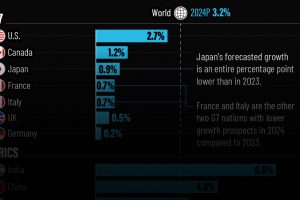The Foreign Countries Holding the Most U.S. Debt
In the international finance system, U.S. debt can be bought and held by virtually anyone.
In fact, if you hold a U.S. Treasury bond or a T-Bill in your portfolio right now, you are already a creditor to the United States government.
And as you can see in today’s chart from HowMuch.net, foreign countries like China and Japan can also accumulate large positions in U.S. Treasurys, making them significant players in the overall United States debt pie.
U.S. Debt: The Big Picture
The United States federal debt currently sits at $22 trillion, and it’s held by a range of domestic and foreign investors.
| Entity | Debt Holdings | Share of Total |
|---|---|---|
| U.S. Government and Federal Reserve | $8.1 trillion | 36.8% |
| Foreign and international | $6.3 trillion | 28.5% |
| Mutual funds | $2.06 trillion | 9.4% |
| Pension funds | $0.92 trillion | 4.2% |
| Banks | $0.77 trillion | 3.5% |
| State and local governments | $0.69 trillion | 3.1% |
| Other investors | $3.18 trillion | 14.5% |
| Total | $21.97 trillion | 100.0% |
As you can see, about $8.1 trillion of debt is held by departments of the U.S. government or the Federal Reserve. This number would include securities sitting in retirement accounts of federal employees, social security trust funds, or any of the Treasurys sitting on the Fed’s balance sheet.
Next, another $7.6 trillion of debt is held by domestic investors. These are marketable securities held by banks, mutual funds, pension funds, insurance companies, and other investors.
While debt held domestically is mostly uninteresting, a bigger question mark is the $6.3 trillion of debt that is owned by foreign countries. After all, couldn’t a country like China “weaponize” its large holdings of Treasury securities as a form of retaliation in the ongoing trade war?
Foreign Owners of the Debt
Internationally, the biggest owners of debt include China and Japan, each with over $1 trillion.
| Rank | Country | U.S. Debt Holdings | Percentage of Foreign U.S. Debt Held (%) |
|---|---|---|---|
| #1 | 🇨🇳 China | $1.11 trillion | 17.3% |
| #2 | 🇯🇵 Japan | $1.06 trillion | 16.5% |
| #3 | 🇧🇷 Brazil | $307 billion | 4.8% |
| #4 | 🇬🇧 United Kingdom | $301 billion | 4.7% |
| #5 | 🇮🇪 Ireland | $270 billion | 4.2% |
| #6 | 🇨🇭 Switzerland | $227 billion | 3.5% |
| #7 | 🇱🇺 Luxembourg | $224 billion | 3.5% |
| #8 | 🇰🇾 Cayman Islands | $217 billion | 3.4% |
| #9 | 🇭🇰 Hong Kong | $206 billion | 3.2% |
| #10 | 🇧🇪 Belgium | $180 billion | 2.8% |
| #11 | 🇸🇦 Saudi Arabia | $177 billion | 2.8% |
| #12 | 🇹🇼 Taiwan | $171 billion | 2.7% |
Why does China hold so much of the foreign-owned U.S. debt?
China has accumulated Treasury securities over decades, as part of its strategy to keep its domestic currency from strengthening. Interestingly, the export-heavy nation has reduced its swath of Treasurys in recent months, selling off close to $200 billion of them.

Although China has $1.11 trillion of Treasurys left in reserve, the general consensus is that dumping all of them at once would destabilize the global financial system, having an equally negative effect on China as well.
That said, with foreign nations holding U.S. debt, such a risk will always exist.
Gimme Shelter
While it’s not surprising to see countries like China, Japan, or Brazil on the list of top foreign debt holders, what are places like the Cayman Islands, Luxembourg, or Ireland doing on the list?
Two simple facts help to explain these anomalies.
Firstly, despite having a population of just 60,000 people, the Cayman Islands is a hedge fund capital with over 10,000 funds domiciled there. Luxembourg makes the list for similar reasons, given that it is the European-based tax shelter equivalent.
Ireland, on the other hand, is the overseas headquarters for many U.S.-based tech giants like Facebook or Alphabet. Apparently, these corporations like to hold their overseas profits in highly-liquid Treasurys, rather than paying a repatriation tax to bring the cash back to American soil.





